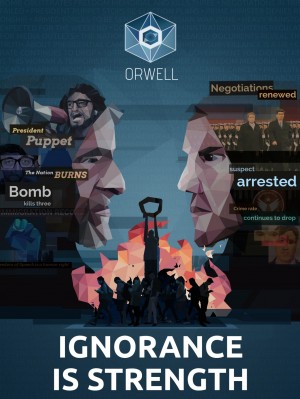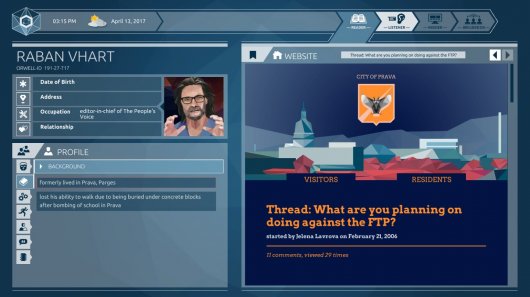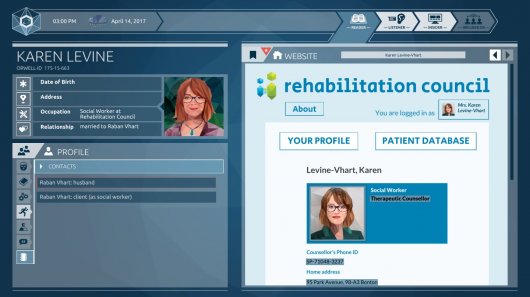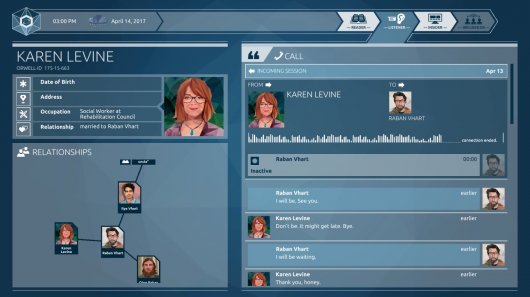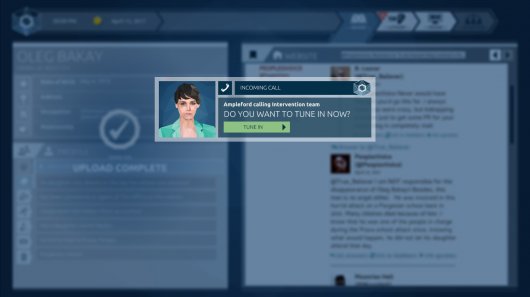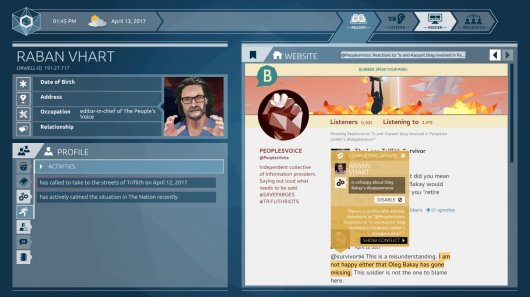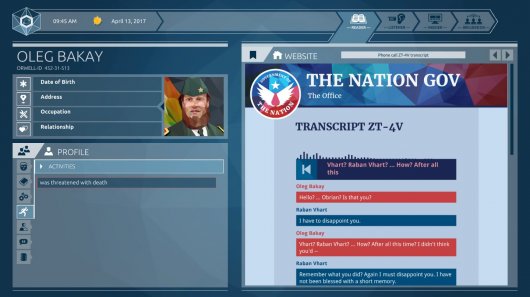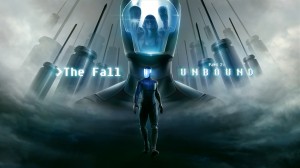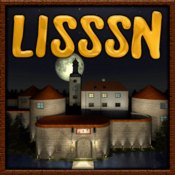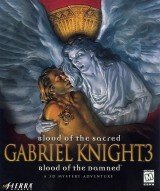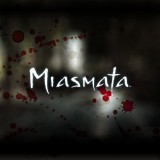Review for Orwell: Ignorance Is Strength page 2
In 1949, when George Orwell’s book Nineteen Eighty-Four was released, the world lived in a state of paranoia, fear and misinformation. I think it’s fair to say, not much has changed. What Orwell could probably not foresee was how much of our own freedom would be willingly handed over by us. Social media has revealed itself as one of the most unprecedented inventions of our time, serving as a tool for individual monitoring and data-mining that would make “Big Brother” squeal with delight and anticipation. Individuals acting out their lives on a digital platform, all laid out for everyone to see? How convenient…
Opportunistic real-world entities thrive on the convenience of a population that knowingly spreads its most personal details publicly, and yet we do this because, really, who gives their digital footprint a second thought? What Osmotic Studios has done in Orwell: Ignorance Is Strength is show how our obliviousness to consequence, this strength we have in our convictions, our opinions and the lives we lead, is really just a cash cow of information that can be easily manipulated. All for reasons we may never know about, and often, are never aware of in the first place.
Freely sharing our information online gives governments unfettered access into our lives, whether we want them to or not. Anonymous agents of freedom, as they were, can now gather data without our express consent with just a few clicks and hashtags. In Ignorance Is Strength, the sequel to 2016’s Orwell, you play just such an agent. Over the course of three episodes, your job is to investigate and utilise the information you uncover to assist in the further protection of The Nation. The pressure is on, and with each new thrilling event and character analysis, your shoulders will inevitably strain from the weight of it all and the choices you’re forced to make.
Episode one starts with your induction into the agency via an aptitude test on a simulated computer screen where the entire game will play out. Your terminal acts as your weapon in the war on terror, now fought on the battlefield of the internet. The test, a thinly-veiled analogy for the precariousness of information, ends with an insult from your boss, Ampleford, who, with a not-so-thinly-veiled sense of disdain, welcomes you to The Office. Ampleford, the “M” to your “007”, is your guide, boss and warden of protection for The Nation. She (in the form of dialogue boxes) pops up to tell you what information is needed and what you can do with it. The Office, an internal government group, acts as The Nation’s watchdog. Your job as an agent is to monitor and mine any and all data obtained via your research.
After passing your test, you listen in on a phone conversation between two men discussing the meaning of truth and technology. It ends, as all calls do in any spy thriller, abruptly and with a scream of desperation: “Truth is dead, as you soon will be.”
This ominous threat leads to your first case, the disappearance of soldier Oleg Bakay. A brief tutorial is given by Ampleford, using the transcript of the phone conversation that just transpired. She explains that knowledge of Oleg’s whereabouts is crucial not only to The Office but to The Nation’s safety as well. Oleg, a high ranking member of the Pargesian army (the neighbouring country), was threatened by the radical Raban Vhart (the other voice in the call), Editor-in-Chief of The National Beholder, an online newspaper propagating fervent anti-army and anti-war sentiments, so his threat has to be taken with the utmost seriousness. Using the latest monitoring software available, you must scour various corners of the web for information that will lead to the discovery of Oleg, lest a political uprising begin.
The program given to you is fittingly called Orwell; this cutting-edge technology allows you to compile data on persons of interest. These pieces of data are referred to as datachunks, which are collected and used through three tools: the Reader (for webpages), the Listener (personal devices), and the Influencer (a propaganda generator that does not become active until episode three). The relevance of all information is up to you to decide, as well as how you use it. Each datachunk that is uploaded consumes 10 minutes of game time, adding to the real-world consequences that could occur should you fail to process the information correctly.
The plot unfolds as you comb through sites such as Blabber and The National Beholder, uncovering a plot thicker than molasses spilled on the sidewalk on a hot summer’s day. Double agents, terrorist attacks, political protests – nothing is ever quite what it seems. Fortunately, no area is off-limits for Orwell, including internal government websites, though as you will learn, some secrets aren’t meant to be seen. Events gain further momentum as Raban Vhart uses his well-groomed manipulation tactics to instigate and control his massive online following in a political discourse. Information conflicts inevitably arise, which makes knowing who and what to believe all the more difficult. Your judgment will be what you rely on the most. Every choice made has an effect and is looked over by Ampleford (who could really do with a chill-pill in my opinion).
Each episode can have a different ending. Depending on the choices you make, and whether they’re made in time, the consequences for certain characters can be life-saving or life-ending. In this troubled world, though, there is no real “happily ever after” for anyone.
Once the Oleg Bakay case is closed, your next mission is to bring down Raban before he can further foster the tension between Parges and The Nation into an all-out civil war. Ampleford directs you to investigate Raban’s background further, as well as the people closest to him, his brother Ilya and his wife Karen. Ilya is Raban’s most devoted advocate, and Raban believes his boasts enough to make Ilya an editor at his paper, as well as his ghost-writer for most of his articles. Good call. Karen, Raban’s loving wife with the strongest I-can-fix-him mentality I’ve ever seen, strives to support Raban any way she can, including helping out his adorable puppy-dog of a younger brother.
The second episode is a more personal affair involving private records and devices (i.e. mobile phones, dating sites, social media sites). Researching someone’s life via their digital interactions is an interesting style of gameplay. Osmotic does a fantastic job of making this feel like an organic process, one that very closely mimics that of real-world activity. Much of it feels like things we all do on a daily basis, a detail I’m sure was intentional on the developer’s part. Digging through a person’s life online poses its own challenge, for as we all know, what we see isn’t necessarily what we get (anyone who has done any kind of online dating will know exactly what I’m talking about).
The decision of who to focus on to bring Raban down lies with you, so be careful about those real-world repercussions I mentioned. Both Ilya and Karen harbour rather large skeletons in their closets, but picking the right one could once again mean the difference between life and death for some. Reading slowly and with a keen eye is key to your investigation. Missing a vital clue is rather easy given the pages and pages of information you must sort through. Just remember that the game doesn’t move forward in time unless you submit information. So choose wisely.
Depending on the outcomes you orchestrate in the first two episodes, the weaknesses in Raban’s life in the final episode will vary. Regardless, Raban eventually finds himself in a fragile position. Distrustful of those around him, his erratic behaviour escalates. Good news for your investigation, bad news for people who like living in a warless country.
To help seal the deal, Ampleford finally introduces you to the Influencer tool, a part of the Orwell program even the government doesn’t know about. This highly manipulative tool uses the datachunks you uncover to create a narrative. This narrative is then spread over the internet to control information to your liking. In this case, you must attempt to discredit Raban to the point of no recovery and turn his army of followers against him. One major change at this point is time passage. Using the Influencer uses an hour of game time, rather than the 10 minutes used by the Reader and the Listener. The choices you make here are of critical importance and could determine the fates of millions of people. Fail, and the world as you know it could be drastically changed. But no pressure.
My own gameplay choices led to a bleak and startling ending, with a commentary on futility intertwined throughout that I found refreshing. The characters revealed themselves to be very impressive, with real depth created through text conversations, emails, and real-time phone calls. All the attention to detail creates a very engaging and immersive world, one that seems to act as a fictional parallel to our own. The decision to limit your interactions with the characters to their digital personas was an ingenious move on the developer’s part. You learn the (literally) most intimate parts of these people’s lives, which then informs the decisions you make later on.
The dialogue, both as text and audio, is quite natural and makes the large amount of content easier to digest. Even with all the reading, the gameplay is quite short, with each episode taking me less than an hour to complete. The multiple paths do allow a higher level of replay, however, so there is still quite a lot to discover after your first time through.
The interface is easy to navigate and is generally executed to a very high standard. The game utilises a point-and-click interface as its exclusive method of interaction; datachunks are moved around with drag-and-drop. The pause menu offers very little in the way of options but is helpful in displaying your current objectives. The data you access (webpages, phone calls, personal devices, etc.) is organized for you in different tabs, and all the information you uncover remains available to you until the end. This, at first, is quite helpful but becomes rather cumbersome over time as the amount of information begins to pile up. Trying to find something quickly or having to go back over something becomes really difficult towards the end of episode two.
As with its predecessor, the challenge of Ignorance Is Strength is figuring out what is relevant and what is not. The only thing really resembling puzzle-solving involves your ability to carefully filter the information you uncover and use it when needed. This then leads to more information being unlocked, which helps you to make better decisions. There are no hints to aid you, which can make things difficult (especially given the amount of data you have to cover), so those who do not enjoy slower, text-filled games might not appreciate all the reading required.
Although essentially a form of “choose your own adventure” game, the 2D graphics are effective in recreating a software program interface that anyone with cursory knowledge of a computer will know how to navigate. The geometric art style helps to mimic the programs parodied (i.e. Blabber, Singular, Hologram) and the utilisation of the blue colour palette is successful in invoking a sleek, government-style feel.
The soundtrack is a nice blend of dystopian synth; think Girl With the Dragon Tattoo meets Cliff Martinez. Each section has its own looped song (Day 1, Raban’s end dialogue, etc.) and ramps up in energy and tension as the game progresses. Sound effects are very satisfying and again play into that feel of operating a real computer program. The voice acting for the most part is quite strong, especially for Raban and Ilya.
Orwell: Ignorance Is Strength raises important questions for modern society. Why do we make the decisions we do? Are we in charge of our destinies? Or are we being manipulated in some way? Would we even care if we knew we were? In an age where headlines involving Russian bots impacting presidential elections and social media websites allowing the sharing and leaking of its users’ personal information are an almost daily event, the game does a fantastic job of imitating a reality I don’t even think George Orwell could have dreamt up. This is anything but a traditional adventure, but for players who enjoy more of a cerebral experience with a touch of social commentary thrown in, this is your game. Just be prepared to read a lot, and be careful about what you do and don’t deem relevant to the cause. Lives are depending on it.


